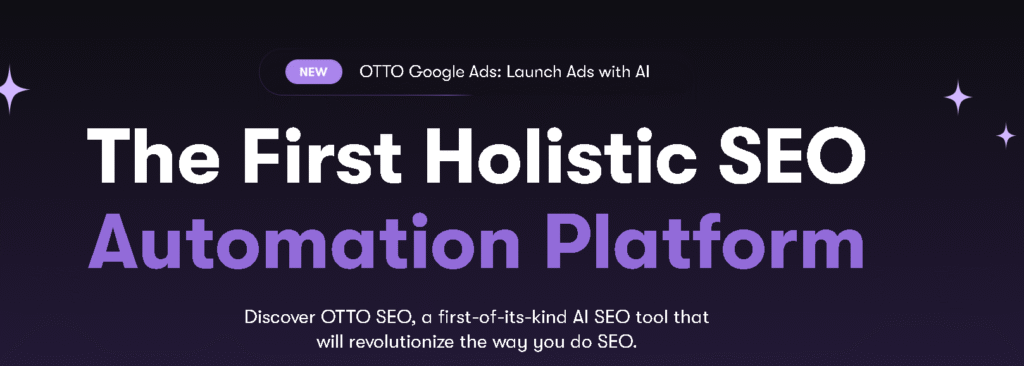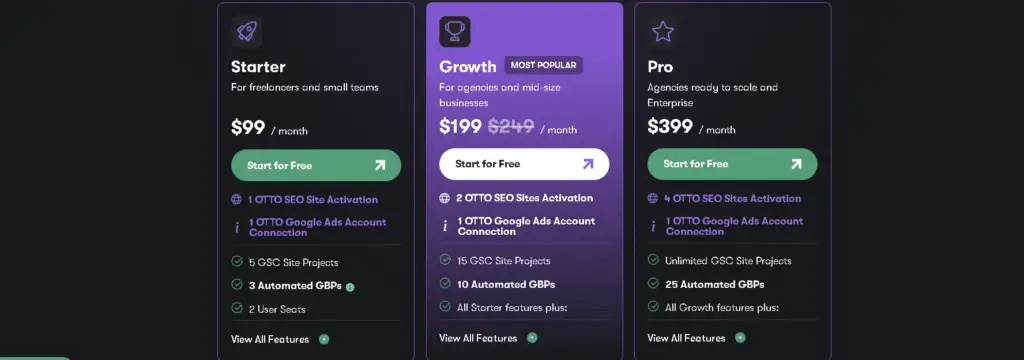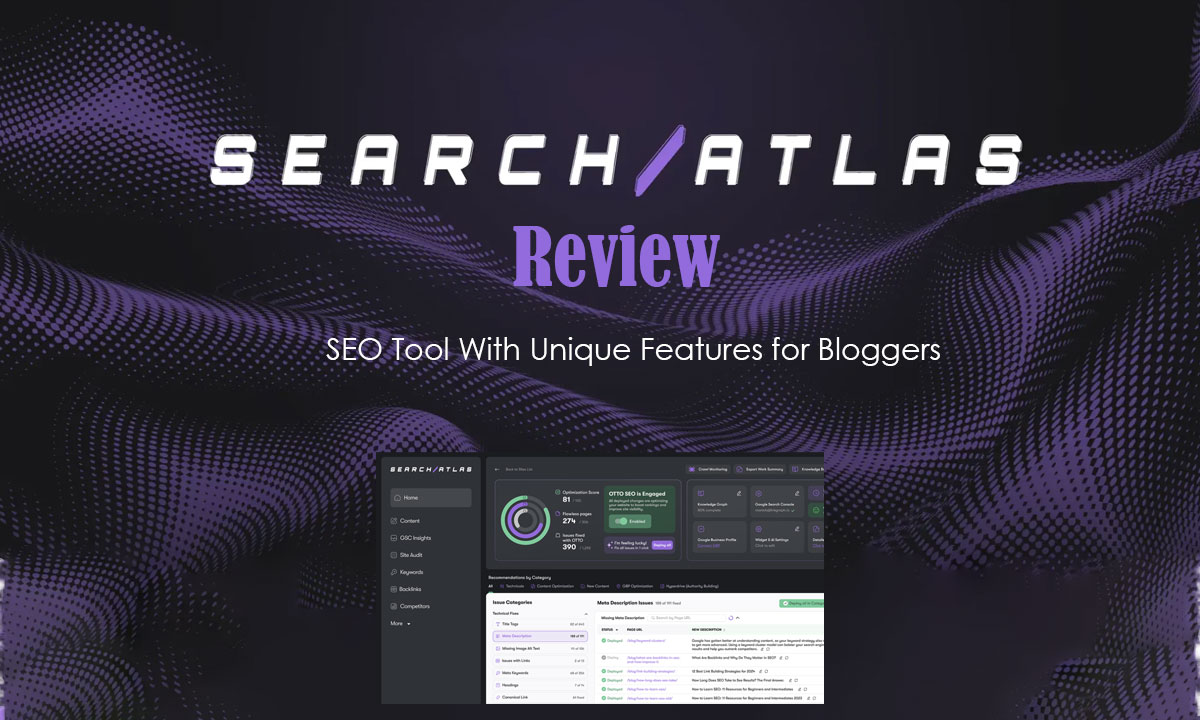If you’re a blogger trying to climb the search rankings (without losing your mind), Search Atlas might just be your new secret weapon.
After giving it a try, I can confidently say I found something refreshing. Search Atlas isn’t just another complex SEO tool loaded with overwhelming features. Sure, it has a lot under the hood, like automated link building, topical analysis, even AI agents for SEO and Google Ads, but it goes even further when it comes to content support.
What really stood out to me? It’s built for people like us. Whether you’re managing a single blog or juggling a few, the scalable pricing actually makes sense.
In this review, I’ll break down their major tools, what they offer, and—more importantly—what they offer differently for bloggers.
What is Search Atlas?

Search Atlas is an all-in-one SEO and PPC software suite, but it’s more than just another keyword research or content editor tool (though it does that too).
What makes it stand out is how much of the busywork it automates, including content optimization, competitor analysis, technical SEO fixes, on-page tweaks, and even link building.
It has AI SEO agents. Actual bots that can make changes to your website. No more endless toggling between tools or waiting on devs to make minor fixes.
While it’s clearly built for brands and agencies, bloggers like us will find its smart automation and content-focused tools super helpful.
How Can You Get a 7-Day Free Trial of Search Atlas?
You can get a 7-day free trial directly from the Search Atlas website. You’ll have full access to all their AI SEO and PPC tools during the trial.
When it comes to pricing, Search Atlas is surprisingly reasonable, especially compared to heavyweights like Ahrefs and Semrush. Here’s the breakdown:

- Starter Plan ($99/month): Great for solo bloggers or freelancers.
- Growth Plan ($199/month): Perfect if you’re running a few sites or working with clients.
- Pro Plan ($499/month): Built for agencies or serious SEO teams.
- Enterprise Plan: Custom pricing if you’re managing tons of websites.
Every plan includes at least one free use of their AI tools, OTTO SEO and OTTO Google Ads. And the more sites you add, the cheaper it gets per site, dropping from $99 to as low as $39. It’s built to grow with you.
What Makes Search Atlas a Good Fit for Bloggers?
We’ll start by walking through the tools most helpful for bloggers and content creators, then explore the broader features designed for a complete SEO strategy.
Scholar
SCHOLAR is a content intelligence tool designed to help you understand and meet Google’s expectations more precisely.
Instead of guessing what might work for SEO, SCHOLAR translates Google’s ranking signals into clear, actionable recommendations.
You input a piece of content, whether it’s a live URL, a draft, or a document, and select a keyword or topic.
SCHOLAR then analyzes the content against a range of criteria that reflect Google’s quality signals and returns a detailed score (from 0 to 100), along with specific feedback on what’s working and what needs attention.
Some of the key areas it evaluates include:
- Content Clarity: Focuses on making your writing more concise and easy to understand, cutting out unnecessary filler.
- Factuality: Checks whether your claims are accurate and relevant, especially for search queries where trust matters.
- Numerical Precision: Rewards the use of data, statistics, and other quantifiable information that enhance credibility.
- Human Effort: Recognizes added value, like original formatting, helpful lists, internal links, or metadata, that indicates hands-on content creation.
- Information Gain: Looks for unique insights or original contributions that go beyond what’s already on the SERP.
- User Intent Alignment: Evaluates whether your content actually addresses what users are searching for.
- Content Freshness: Assesses how recently the content has been updated or revised.
- Entities and Contextual Flow: Makes sure relevant topics are covered thoroughly and organized in a logical, natural way.
SCHOLAR points out where your content meets Google’s standards, where it falls short, and exactly what to fix.
Content Genius
Content Genius is an AI-powered content editor built into the Search Atlas platform. It’s designed to make content creation and optimization easier by blending the power of ChatGPT and Claude with SEO-focused tools.
Users can generate full-length articles, outlines, NLP suggestions, internal links, competitor analysis, and even AI-generated images, all within one interface.
During the creation of the article with AI, Content Genius checks the top 20 Google results for your keyword, analyzes SEO elements like headings, links, word count, schema, and surfaces key NLP terms your competitors use.
To get started, you can just:
- Create a folder with basic websites and writing preferences.
- From there, you can choose between three workflows: Write on your own, write with AI, or generate content in bulk.
- Select the target keywords.
- Generate the SEO-friendly content tailored to those keywords.
Once content is generated, it’s saved in a table within the Content Genius dashboard, making it easy to manage, edit, or export.
You can also configure the AI settings according to your needs. There’s plenty of configuration, such as the AI model, language, voice, point of view, reading level, content length, writing style, FAQ section, and more.
Once your article is ready, you can even connect it with your WordPress via the SearchA tlas and publish it in one click.
Just open the article, hit “Synchronize,” fill in your post details, and click “Publish Blog Post.” Updates work the same way: Edit, sync, and it goes live.
On-page Optimization tool
The Onpage Audit tool in Search Atlas helps you improve your web pages by analyzing the four key areas of SEO: authority, content, technical performance, and page experience.
Just add your page URL, target keywords, and location to run a complete audit.
It checks how your content compares to top-ranking competitors, showing your content score, word count, and readability side by side with theirs. You’ll see ideal targets for each based on what’s working in the SERPs right now.
The audit also gives you metrics like authority, technical score, and pagespeed scores (for both desktop and mobile), plus insights on referring domains and internal linking.
If there are technical issues (like missing meta tags, broken images, or thin content) they’ll be flagged so you can fix them quickly.
Content Planner
The Search Atlas Content Planner helps you quickly build out a content strategy by turning one target keyword into a full calendar of SEO-friendly article ideas.
Just enter a keyword and city, and the tool will scan the top 20 search results for that keyword, pulling in all the related keywords those pages rank for.
These keywords are automatically grouped into topic clusters, saving you the time and effort of manual research. You can view everything in a clean table format—perfect for comparing clusters side by side.
When you’re ready to write, click the pen icon next to a cluster, choose the keywords you want to focus on, and hit “Create New Article.”
You can even generate AI article suggestions before you begin. The tool will automatically generate them using Content Genius.
Blog Idea Generator
The Search Atlas Blog Idea Generator makes it easy to come up with fresh, relevant blog topics based on any keyword you enter.
Just type in a target keyword, and the tool instantly provides a list of blog topic ideas tailored to that term, perfect for filling out your content calendar or overcoming writer’s block.
It’s a quick way to spark inspiration and keep your blog full of content that speaks directly to your audience’s interests.
Topical Map Generator
The Search Atlas Topical Map tool helps organize and structure your content strategy around a specific target keyword or topic.
It allows you to build a map of related clusters (categories) and long-tail keywords, making it easier to create content that is comprehensive and relevant to your audience.
You can customize the number of clusters, long-tail keywords for each, and titles for each keyword, allowing for highly targeted content planning.
Once you create your topical map, you can view and edit the map, adding content ideas that align with your strategy.
These ideas can be displayed in either a diagram or table format, and you can click to add them to your map. Once your map is set, you can create articles, publish them to your WordPress site, and keep everything synced with the Search Atlas WordPress plugin.
Topical Dominance tool
The Search Atlas Topical Dominance tells you how strong and complete your content is within a given topic, and how that stacks up against your competitors.
Instead of just chasing keywords or backlinks, the Topical Dominance tool zooms out and shows the bigger picture: How well does your content ecosystem really cover the topic your audience (and search engines) care about?
You can benchmark your site against others, visualize where you stand in a scatter plot or heatmap, and spot the gaps.
It’s a smart way to see exactly what you’re missing and what to prioritize next to boost your authority in an area.
Which SEO Features Does Search Atlas Offer?
Search Atlas is an all-in-one SEO platform, which means you will also have access to a complete SEO suite of tools.
Keyword Research Tools
Search Atlas equips you with the essentials to uncover high-impact keywords and better understand searcher intent. Here’s a look at what it offers:
- Keyword Research: Access data on search volume, competition levels, user intent, and historical trends.
- Keyword Magic Tool: Automatically generates keyword lists categorized by intent, helping you fine-tune your targeting.
- Keyword Gap: Compare your site’s performance against competitors to uncover areas where you can gain an edge.
With access to a vast database of 5.2 billion keywords, Search Atlas focuses on relevance, not overload—so your keyword quota is spent wisely and effectively.
Competitor Analysis
Search Atlas delivers a full suite of competitive insights, similar to those in enterprise-level platforms—plus a few standout features:
- Site Explorer: Analyze your competitors’ organic and paid traffic, keyword strategies, backlink profiles, and authority signals like Domain Power, DA, TF, and CF.
- Backlink Gap: Quickly identify backlink opportunities by comparing your site with others in your space.
- Backlink Analyzer: Evaluate the strength of your backlink profile and see how it stacks up against the competition.
Outreach Tools
For anyone involved in link building or guest posting, Search Atlas offers streamlined tools to simplify the process:
- Use customizable email templates to save time and maintain consistency.
- Manage campaigns with a central dashboard that handles outreach and follow-ups.
- AI-powered HARO Automation finds matching opportunities, writes tailored pitches, and tracks submissions—all in one place.
This integrated approach is ideal for agencies or teams working at scale, especially since it connects directly with Link Laboratory, one of the most extensive published link databases. Instead of managing multiple tools, everything is built into the Search Atlas workflow.
What Are the Pros and Cons of Search Atlas?
The main advantages of Search Atlas revolve around its innovative features, while the challenges primarily concern getting up to speed with these new tools.
Pros
- All-in-one: Replaces multiple SEO tools.
- Automation: Simplifies SEO tasks with new automation features.
- User-friendly Interface: It’s easy to use with a minimal learning curve.
- Cost-effective: The pricing is fair and scalable.
- Accurate data: Provides real data from Google.
Cons
- AI quota limits: May not suffice for large websites.
- Complex features: New tools can be complex, but onboarding is available.
- Past instability: Issues have been addressed by an expanded team.
Wrapping It Up: Is Search Atlas a Good Fit?
Yes. We recommend Search Atlas for bloggers because it offers cutting-edge tools that simplify content creation and automate many time-consuming SEO tasks.
Search Atlas lets you focus more on writing and less on the technical side. But what makes Search Atlas stand out is its suite of AI features like automated link building, content optimization, and in-depth competitor analysis.
These tools are designed to scale with your needs, making it easier to grow your online presence without getting bogged down in manual work.

